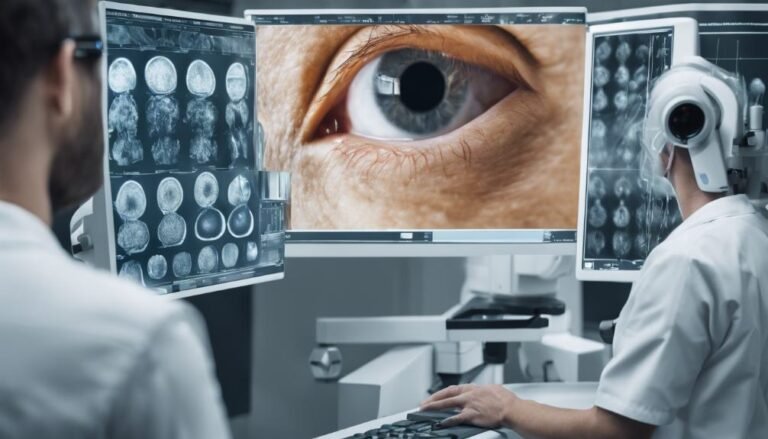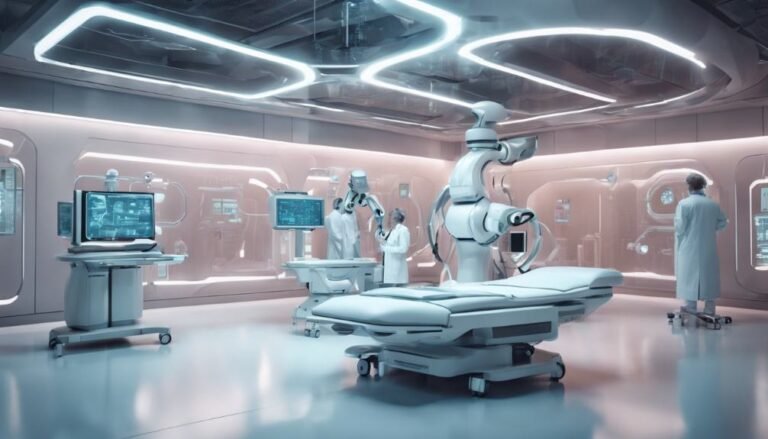AI in Minimally Invasive Surgery
Imagine this: Did you know that a recent study found that AI systems in minimally invasive surgery have shown a 21% improvement in surgical performance compared to traditional methods? The impact of AI on surgical outcomes is profound, but what exactly makes these systems so effective in the operating room? Let's explore how AI is reshaping the landscape of minimally invasive surgery and the implications it holds for the future of healthcare.
Key Takeaways
- AI enhances surgical precision in minimally invasive procedures.
- Real-time decision support improves surgeon expertise.
- Machine learning algorithms offer personalized guidance.
- AI revolutionizes surgical navigation with advanced technology.
- Enhances accuracy and reliability during minimally invasive surgeries.
Evolution of Minimally Invasive Surgery
The evolution of minimally invasive surgery has revolutionized the field of medical procedures, allowing for less invasive techniques with shorter recovery times. Technological advancements in surgical techniques have played a pivotal role in enhancing patient care and post-operative recovery. Surgeons now have access to advanced tools and equipment that enable them to perform intricate procedures through small incisions, reducing the trauma to the body compared to traditional open surgeries.
These technological advancements have led to significant improvements in patient outcomes, with reduced pain, lower risk of complications, and shorter hospital stays. Minimally invasive surgical techniques involve the use of specialized cameras and instruments that provide high-definition visuals of the surgical site, allowing for greater precision and accuracy during procedures.
Moreover, these techniques promote faster healing and recovery times, enabling patients to return to their daily activities sooner. By minimizing tissue damage and reducing the overall surgical impact on the body, minimally invasive surgery has set a new standard in modern healthcare, prioritizing patient comfort and well-being throughout the treatment process.
Role of AI in Surgical Navigation
Navigate complex anatomical structures with precision using AI algorithms that provide real-time decision support during surgical procedures.
AI systems enhance surgeon expertise by offering detailed insights and guidance, ultimately improving surgical outcomes.
Embrace the future of surgical navigation with AI technology that revolutionizes the way procedures are carried out with unparalleled accuracy.
Precision in Surgical Navigation
Improving surgical precision through advanced AI algorithms is transforming the field of minimally invasive surgery. Surgical accuracy is greatly enhanced through the seamless integration of AI technologies into navigation systems. Machine learning plays a crucial role in enhancing surgical navigation by providing real-time feedback and guidance to surgeons during procedures.
These AI-powered navigation systems utilize intricate algorithms to process vast amounts of data, including pre-operative imaging scans and real-time patient feedback. By analyzing this data swiftly and accurately, the systems can assist in identifying best paths for surgical instruments, improving the overall precision of the procedure.
Furthermore, AI algorithms continuously learn and adapt based on the feedback received during surgeries, refining their recommendations and increasing their accuracy over time.
This dynamic capability ensures that surgeons have access to the most up-to-date and personalized guidance during minimally invasive procedures, ultimately leading to improved patient outcomes and enhanced surgical experiences.
Real-Time Decision Support
Incorporating AI into surgical guidance systems revolutionizes real-time decision support during minimally invasive procedures. Real-time analytics generated by AI algorithms provide surgeons with immediate insights into the surgical field, enhancing precision and efficiency.
By analyzing data from imaging technologies like CT scans or MRIs in real-time, AI can offer automated decision-making support to assist surgeons in maneuvering through complex anatomical structures with enhanced accuracy.
AI algorithms process vast amounts of data instantaneously, identifying critical structures and anomalies within the patient's body. This real-time analysis enables surgeons to make informed decisions promptly, leading to more precise and successful outcomes.
Automated decision-making capabilities help streamline the surgical process, reducing the likelihood of human error and improving overall patient safety.
Furthermore, AI-powered surgical guidance systems continuously adapt to real-time feedback, enhancing their accuracy and reliability during procedures. By integrating AI-driven real-time decision support, surgeons can address surgical challenges with confidence, ultimately advancing the field of minimally invasive surgery.
Enhancing Surgeon Expertise
Utilizing AI in surgical navigation greatly enhances your expertise by providing real-time guidance and insights during minimally invasive procedures. This surgeon assistance guarantees precision and accuracy by offering detailed anatomical information, helping you navigate complex structures with ease. AI algorithms analyze real-time imaging data, highlighting critical areas, and suggesting best paths for incisions or instrument placement.
The skill enhancement AI offers goes beyond traditional navigation methods, allowing you to make informed decisions swiftly. By integrating AI into surgical navigation systems, you can benefit from predictive modeling that anticipates potential complications and offers proactive solutions. This real-time support enables you to adapt to changing surgical scenarios effectively, ultimately improving patient outcomes.
Moreover, AI-driven navigation systems can streamline your workflow by automating repetitive tasks, freeing you to focus on intricate aspects of the procedure. The continuous feedback loop provided by AI ensures that you stay on track and make informed decisions throughout the surgery, ultimately enhancing your overall proficiency in minimally invasive techniques.
Advantages of AI in Surgery
AI in minimally invasive surgery offers a multitude of benefits, revolutionizing the field with its precision and efficiency.
Machine learning and predictive analytics are at the core of AI advancements in surgery, enabling real-time analysis of patient data to predict potential outcomes and complications. Image recognition technology plays a pivotal role by enhancing the accuracy of pre-operative planning and intraoperative decision-making. By analyzing vast amounts of medical images, AI can assist in identifying abnormalities and guiding surgeons towards best surgical pathways, ultimately leading to improved surgical outcomes.
The use of AI in surgery not only reduces the margin of error but also enhances the overall efficiency of procedures. Through predictive analytics, AI can help surgeons anticipate potential challenges during surgery, allowing for proactive decision-making and reducing complications. This level of precision and foresight can have a substantial impact on patient recovery times and post-operative care.
As AI continues to evolve, its integration into minimally invasive surgery holds promising advantages for both surgeons and patients alike.
AI-Driven Robotic Assistance
Enhancing surgical capabilities, robotic assistance driven by AI technology has transformed the landscape of minimally invasive procedures, providing surgeons with unparalleled precision and control. Robotic assistance in surgery involves the integration of advanced robotic systems equipped with learning algorithms that enable them to analyze data in real-time and make precise adjustments during procedures. These robots are designed to work collaboratively with surgeons, offering benefits such as increased dexterity, smaller incisions, and improved visualization.
Through the utilization of learning algorithms, robotic systems can adapt to the specific needs of each procedure, enhancing their ability to assist surgeons in complex tasks. The AI-driven robotic assistance not only improves the accuracy of movements but also reduces the margin of error, leading to better patient outcomes.
Surgeons can leverage these robotic tools to perform intricate maneuvers with enhanced efficiency and reduced risk, ultimately revolutionizing the field of minimally invasive surgery.
Precision Medicine With AI
Precision medicine techniques, empowered by cutting-edge artificial intelligence technology, are revolutionizing the landscape of personalized patient care in the field of minimally invasive surgery.
AI plays a pivotal role in personalized treatment by harnessing data-driven technologies to analyze vast amounts of patient data quickly and efficiently. Machine learning algorithms are utilized to develop predictive analytics models that aid in surgical precision.
These models process complex data sets to provide surgeons with valuable insights into individual patient characteristics, allowing for tailored treatment plans that optimize outcomes and minimize risks.
Challenges and Ethical Considerations
You need to address the privacy concerns associated with AI in minimally invasive surgery, particularly regarding the protection of patient data and the potential risks of unauthorized access.
Additionally, it's essential to tackle the issue of bias in AI algorithms, ensuring that these technologies are developed and implemented in a fair and unbiased manner to prevent any negative consequences on patient care and outcomes.
Privacy Concerns in AI
Within the domain of AI in minimally invasive surgery, the integration of advanced algorithms raises pertinent privacy concerns that demand meticulous attention to both challenges and ethical considerations.
Data security plays a vital role in safeguarding patient information stored or utilized by AI systems. Ensuring encryption, limited access, and secure transmission of data are essential practices to mitigate risks of breaches or unauthorized access.
Ethical implications arise concerning the responsible handling of sensitive patient data, requiring transparency in how information is collected, used, and shared within AI systems. Maintaining patient confidentiality and upholding trust are paramount in the development and deployment of AI technologies in surgery.
Striking a balance between leveraging patient data for innovation while respecting individual privacy rights is a delicate yet necessary endeavor. By addressing these privacy concerns with conscientious practices and ethical frameworks, the integration of AI in minimally invasive surgery can advance while upholding the highest standards of data security and ethical conduct.
Bias in AI Algorithms
As AI algorithms become increasingly integrated into minimally invasive surgery, addressing bias presents significant challenges and ethical considerations that demand careful examination.
Ethical implications arise when biased algorithms affect patient outcomes, potentially leading to disparities in healthcare delivery. Algorithm transparency is vital to understanding how decisions are made, especially in critical surgical procedures where accuracy is paramount.
Data bias, whether due to skewed datasets or algorithm design, can perpetuate existing inequalities in healthcare. Ensuring algorithm fairness is imperative to mitigate these biases and provide equitable treatment for all patients.
Aiming for fairness involves continuously monitoring algorithms for discriminatory patterns and adjusting them accordingly.
Ethical considerations extend to the responsibility of healthcare providers and developers to prioritize patient well-being over efficiency gains. Transparency in algorithm development and implementation is key to building trust with patients and healthcare professionals.
AI Integration in Operating Rooms
Integrating artificial intelligence (AI) into operating rooms has revolutionized the field of minimally invasive surgery by enhancing precision and efficiency in surgical procedures. AI integration in operating rooms involves the use of advanced technologies to streamline processes, optimize workflows, and improve patient outcomes.
AI algorithms can analyze real-time data from various sources within the operating room, such as imaging scans, critical signs monitors, and surgical instruments, to provide surgeons with valuable insights and decision support. This real-time data analysis enables AI systems to assist in identifying potential complications, suggesting best surgical techniques, and even predicting patient outcomes.
Moreover, AI integration in operating rooms can enhance communication among surgical teams by providing instant access to critical information and facilitating seamless collaboration.
Future Innovations in Minimally Invasive Surgery
Future advancements in minimally invasive surgery are poised to revolutionize the field with cutting-edge technologies and innovative techniques. AI-powered diagnostics are one of the key areas of focus for future innovations. Through the use of artificial intelligence, surgeons will be able to receive real-time data analysis and insights during procedures, enhancing decision-making and overall surgical precision.
Moreover, remote surgery capabilities are set to transform the landscape of minimally invasive procedures. With advancements in telemedicine and robotic technology, surgeons will have the ability to perform surgeries from a remote location, enabling access to specialized care for patients in remote areas or emergency situations. This technology opens up possibilities for collaboration between surgeons across the globe, sharing expertise and skills in real-time.
In the near future, these advancements in AI-powered diagnostics and remote surgery capabilities will unquestionably enhance the efficiency, safety, and outcomes of minimally invasive surgeries, marking a new era in the field of surgical innovation.
Enhanced Patient Outcomes With AI
Implementing AI in minimally invasive surgery has greatly improved patient outcomes by providing surgeons with real-time data analysis and insights during procedures. AI diagnostics play an essential role in enhancing patient outcomes by enabling early detection of anomalies and assisting in precise decision-making. Through AI-powered tools, surgeons can analyze vast amounts of patient data quickly and accurately, leading to more personalized treatment plans and better surgical outcomes.
Furthermore, AI facilitates continuous patient monitoring before, during, and after surgery. By integrating AI into patient monitoring systems, healthcare providers can track vital signs, detect changes in real-time, and promptly address any complications that may arise. This proactive approach to patient care significantly contributes to improved recovery rates and overall patient satisfaction.
Conclusion
As you navigate the world of minimally invasive surgery, AI stands as a beacon of innovation and advancement. Embrace the precision and efficiency that AI offers in surgical navigation, while also considering the ethical implications and challenges that come with this cutting-edge technology.
With AI-driven robotic assistance and personalized guidance, the future of minimally invasive surgery holds promise for enhanced patient outcomes. Stay ahead of the curve and embrace the AI revolution in the operating room.







